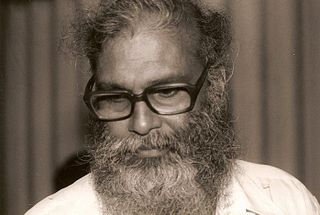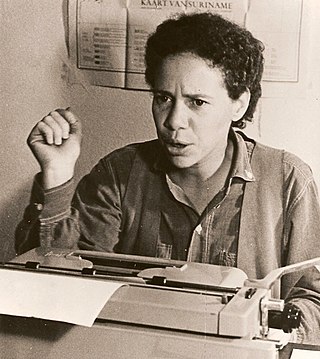
Suriname, officially the Republic of Suriname, is a country in northern South America, sometimes considered part of the Caribbean and the West Indies. Situated slightly north of the equator, over 90% of its territory is covered by rainforests, the highest proportion of forest cover in the world. Suriname is bordered by the Atlantic Ocean to the north, French Guiana to the east, Guyana to the west, and Brazil to the south. It is the smallest country in South America by both population and territory, with around 612,985 inhabitants in an area of approximately 163,820 square kilometers. The capital and largest city is Paramaribo, which is home to roughly half the population.

This is a demography of the population of Suriname, including population density, ethnicity, education level, health of the populace, economic status, religious affiliations, and other aspects of the population.
"God zij met ons Suriname", or "Opo kondreman", is the national anthem of Suriname. It has two verses: the first in Dutch and the second in Sranan Tongo.
Sranan Tongo is an English-based creole language that is spoken as a lingua franca by approximately 519,600 people in Suriname.

The Paramaccan or Paramaka are a Maroon tribe living in the forested interior of Suriname, mainly in the Paramacca resort, and the western border area of French Guiana. The Paramaccan signed a peace treaty in 1872 granting the tribe autonomy.
The Kwinti are a Maroon people, descendants of runaway African slaves, living in the forested interior of Suriname on the bank of the Coppename River, and the eponymous term for their language, which has fewer than 300 speakers. Their language is an English-based creole with Dutch, Portuguese and other influences. It is similar to the languages spoken by the Aluku and Paramaccan Maroons, and split from Sranan Tongo in the middle 18th century. The Kwinti had a population of about 300 in 2014 and adhere to the Moravian Church.
Indo-Surinamese, Indian-Surinamese or Hindustani Surinamese are nationals of Suriname of Indian origin, who trace their ancestry to India and the wider subcontinent. Their ancestors were indentured workers from British Raj brought by the Dutch and the British to the (then) Dutch colony of Suriname during the mid-19th to the early 20th century. Per the 2012 Census of Suriname, 148,443 citizens of Suriname are of Indo-Surinamese origin, constituting 27.4% of the total population, making them the largest ethnic group in Suriname on an individual level.

Surinamese Dutch, also known as Surinaams is the form of Dutch spoken in Suriname and is the official language in Suriname, a former Dutch colony. Dutch is spoken as a native language by about 80% of the population, most of them being bilingual with Sranan Tongo, Hindustani, Javanese, and other languages. Nevertheless, Dutch is the country's sole official language. Surinamese Dutch is easily intelligible with other forms of Dutch. Furthermore, as opposed to other languages that have different forms in the Americas the regulation and thus standardised spelling of the Dutch language is done through a joint Dutch–Belgian–Surinamese organization, the Dutch Language Union, and thus has no regional differences regarding spelling. Suriname has been an associate member of this Nederlandse Taalunie since 2004. Therefore, many typical Surinamese words were added to the official Wordlist of Standard Dutch, known as "the Green Booklet".

Cynthia Henri McLeod is a Surinamese novelist known for her historic novels and whose debut novel instantly made her one of the most prominent authors of Suriname.

Michaël Henricus Gertrudis (Michiel) van Kempen is a Dutch writer, art historian and literary critic. He has written novels, short stories, essays, travel literature and scenarios. He was the compiler of a huge range of anthologies of Dutch-Caribbean literature and wrote an extensive history of the literature of Suriname, in two volumes.

Surinamese people are people who identify with the country of Suriname. This connection may be residential, legal, historical or cultural. For most Surinamese, several of these connections exist and are collectively the source of their being Surinamese.
Surinamese people in the Netherlands are people in the Netherlands who come from a Surinamese background. From 1667 to 1975, Suriname was a colony of the Netherlands.

Kathleen Gertrud Ferrier is a former Dutch politician of Surinamese descent and development aid worker. She served as a member of parliament of Netherlands representing the party Christian Democratic Appeal from 2002 to 2012.

André R.M. Pakosie is a Surinamese historian, poet, Ndyuka activist and Edebukuman of the Afaka script.

Indonesia and Suriname established diplomatic relations in 1975. Both had a special relationship, based upon shared common history as former colonies of the Dutch Empire. Large numbers of Javanese migrated to Suriname to work on plantations during the late 19th and early 20th-centuries. Indonesia has an embassy in Paramaribo also accredited to the Co-operative Republic of Guyana, while Suriname has an embassy in Jakarta. Indonesia and Suriname are members of the World Trade Organization (WTO) and Forum of East Asia-Latin America Cooperation.

James Ramlall, also known as Bhai, was a Surinamese poet.

Thea Doelwijt is a Surinamese-Dutch writer.

Surinamese Maroons are the descendants of enslaved Africans that escaped from the plantations and settled in the inland of Suriname. The Surinamese Maroon culture is one of the best-preserved pieces of cultural heritage outside of Africa. Colonial warfare, land grabs, natural disasters and migration have marked Maroon history. In Suriname six Maroon groups — or tribes — can be distinguished from each other.

The Matawai are a tribe of Surinamese Maroons. The Matawai were originally part of the Saramaka, and signed a peace agreement with the Dutch colonists in 1762. The tribe split from the Saramaka, and in 1769, they were recognized as a separate tribe.

Christiaan Hendrik "Hein" Eersel was a Surinamese linguist and cultural researcher.















